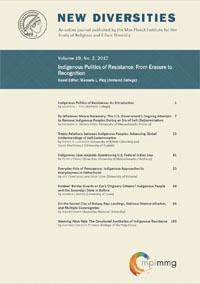Treaty Relations between Indigenous Peoples: Advancing Global Understandings of Self-Determination
by Sheryl R. Lightfoot (University of British Columbia) and David MacDonald (University of Guelph)
To cite this article: Lightfoot, S. R., & MacDonald, D. (2017). Treaty Relations between Indigenous Peoples: Advancing Global Understandings of Self-Determination. New Diversities, 19(2), 25–39. https://doi.org/10.58002/7xq1-zk90
Nation-states around the world tend to view Indigenous nations’ claims for sovereignty and self-determination in zero-sum terms, fearing that any advancement in Indigenous peoples’ self-determination means a loss of sovereignty or territorial integrity for nation-states. This article aims to shed light on how Indigenous political actors in several countries are advancing self-determination in practice with, within, and across the borders of individual states, while navigating the international system, in assertive, maximal, innovative, and peaceful ways that do not result in a loss of nation-state sovereignty or territorial integrity. Some Indigenous peoples are entering into treaty or partnership agreements with other Indigenous groups, in conjunction with state institutions, or completely outside state purview. We examine several cases of such treaty relations and draw some conclusions about how these types of Indigenous-to-Indigenous treaty relations are enhancing and advancing Indigenous self-determination.
Keywords: Indigenous peoples, Indigenous politics, self-determination, treaties, state sovereignty, colonization, Indigenous rights, UNDRIP, plural sovereignty
|
